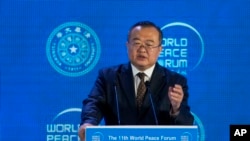U.S. Secretary of State Antony Blinken plans to meet with Liu Jianchao, a veteran Chinese diplomat and a top contender to be China's next foreign minister, in Washington on Friday, a day before Taiwan’s elections, as the United States continues to caution China against using the elections as a pretext for instability.
Communication between the world’s two largest economies will continue after Taiwan’s presidential and legislative elections on Saturday, as senior officials from the United States and China are slated to attend next week's World Economic Forum in Davos, Switzerland.
On Friday, Blinken will hold talks at the U.S. State Department with Liu, who heads the Chinese Communist Party’s international department responsible for maintaining relations with foreign political parties.
“Liu is a trusted member of Chinese President Xi Jinping’s inner circles of advisers. He is a leading candidate for foreign minister,” according to former CIA top China analyst Dennis Wilder, now a professor at Georgetown University.
Wilder told VOA on Thursday that Liu’s visit is “designed in part to make sure Washington and Beijing understand each other before the new Taiwan leader is elected.”
Daniel Kritenbrink, the State Department’s top diplomat on East Asian and Pacific affairs, will join the hourlong meeting, according to people familiar with the planning.
"Liu has taken on a more active diplomatic role and has been performing tasks typically handled by China's foreign minister,” said Chechuan Lee, a research fellow at the Taipei-based quasi-official Institute for National Defense and Security Research.
Lee told VOA that "it is not unimaginable" that Liu could be selected as China’s next top diplomat, and his meetings in Washington this week with senior U.S. officials may be paving the way for his next position.
Next week, Blinken and Chinese Premier Li Qiang will attend the annual economic meetings at the Swiss mountain resort.
The State Department said in a statement that Blinken would discuss issues of global concern, including the U.S. commitment to the rules-based international order, while attending meetings in the World Economic Forum in Davos.
Blinken’s talks with Chinese officials are described as ongoing efforts to maintain open lines of communication, responsibly manage differences between the two nations and address a host of issues. These include global and regional security concerns such as tensions on the South China Sea. Taiwan will also be among the topics.
Washington has voiced its opposition to “outside interference or malign influence” in Taiwan’s elections.
On Thursday, State Department deputy spokesperson Vedant Patel said the U.S. has “a deep confidence in Taiwan's democratic process and believe it is for Taiwan voters to decide their next leader, free from outside interference.”
The winner of Taiwan’s presidential election will be inaugurated on May 20. The transition period in the upcoming months is seen as sensitive in cross-strait relations.
A senior U.S. administration official told reporters late Wednesday that Beijing would be “the provocateur” if it chose to respond to Taiwan's election results with additional military pressure or coercion.
“Throughout this election and transition period, we will ensure that channels of communication remain open with Beijing, including diplomatic and the recently reopened military-to-military channels, in keeping with past precedent and our unofficial relationship with Taiwan," said the U.S. official.
A number of meetings
This week, U.S. and Chinese officials are holding numerous meetings. The U.S. principal deputy national security adviser, Jon Finer, held lengthy talks with Liu on Wednesday.
The White House said the two sides discussed the ongoing implementation of key outcomes from last November’s summit between U.S. President Joe Biden and Xi, challenges in the Middle East and Russia’s war against Ukraine. Finer stressed the importance of peace and stability across the Taiwan Strait and in the South China Sea.
U.S. Homeland Security Secretary Alejandro Mayorkas held virtual talks on Wednesday with Chinese Minister of Public Security Wang Xiaohong, discussing the combating of the illicit flow of synthetic drugs.
U.S. Secretary of Commerce Gina Raimondo also held a call with China's Minister of Commerce Wang Wentao late Wednesday to follow up on leveraging the working group that the two sides have established to address commercial issues of concern.
Science and technology agreement
At the State Department, officials from the two countries discussed the extension of the U.S.-China Science and Technology Agreement, or STA, which is due to expire next month. Officials will meet again during the week of January 22 to discuss the extension.
Late last August, Washington agreed to extend the agreement with China for six months. The short-term extension came as several Republican congressional members voiced concern that China has previously leveraged the agreement to advance its military objectives and may continue to do so.
At that time, the State Department stated the brief extension would maintain the STA's validity while the U.S. negotiated with China to amend and strengthen the agreement.
A call for reciprocity
Some former U.S. officials are skeptical about whether frequent talks can fundamentally change Beijing’s behaviors, which are deemed as harming Washington’s national interests. They also advocate for reciprocity.
“Every time a People’s Republic of China emissary is allowed to address the American people, an American emissary needs to be able to directly address the Chinese people. If the PRC won’t accept this, then we are foolish to keep giving people like Liu direct access,” said David Stilwell, a former assistant secretary of state for East Asian and Pacific affairs.
Liu delivered a speech on Tuesday during an event hosted by the Council on Foreign Relations.





